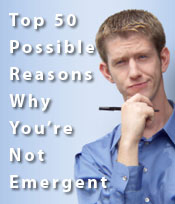
This is a second part of my response to Bill Easum’s blogologue with Tony Jones on Emergent Village. The first part of this response can be found here. Bill’s original post can be found here.
Bill asked a series of questions for the Emergents. And I thought I would respond to these questions. But before I begin I would like to respond to what I mean by Emergent and what this word means to me. I take it very seriously and have suffered the consequences for the baggage that it holds, most of which I find to be myth. And let me be clear that this is my definition.
Emergent, to me, is a creative attempt to find a wholistic understanding and practice in what it means to follow Jesus into God’s mission. It is an an attempt to get at the heart of what it means to be a broken human in a broken world that is dying for restoration. This attempt begins with generative conversation, or the willingness to lay aside what we think is right so we can first address the reality that something is just not quite right with this body called the church. The evidence is now (even as Easum admitted) overwhelming. The conversation is organic, chaotic, unrestricted, and based in a deep grace and willingness to love. It is taking a deep look into the existing frameworks we operate in and deconstruct as led by the Holy Spirit. Some of this deconstruction is occurring in our orthodoxy, some in our orthopraxy, and mostly in our own hearts, or as Peter Rollins says, “believing in the right way.”
Our hope is not to destroy the church, but much like an architect take a deep at the foundations we often take for granted. Our hope is to remove the dross that leaves us all exhausted and wondering if there is more to the cross. The risk we take is to trust that no matter how much we get it wrong that truth will win out in the end. We are attempting to be God’s creativity lived out. We hold lightly to everything for the sake of abandoning quickly what should never be held. But we also know that the more we seek, the more we will find, the more we knock, the more the door will open, and the more we ask, the more we will receive. We step carefully in the footsteps of Jesus with the understanding that the Holy Spirit will reveal His kingdom and restore our soul.
With that being said, Bill asked the following question(s). My responses are in italics.
Bill: So here’s my question for the Emergents: In a world where so many people are searching for spiritual guidance from so many venues, can you offer to take the position that Christians have to become like them in order to offer the direction they are seeking?
We already are like them. We’re first human beings created in the image of God. And we are first called to love them. And this means sitting with them regardless of their circumstances as human beings created in them. This willingness to love is God’s distinct aroma. This love is perfect theology. It is the outpouring of the Gospel into their lives. It is to step into the spaces that are broken not for the sake of being heard but to be the space God shows up in the world and changes lives. We don’t change people. We simply get to participate in that change as the Holy Spirit moves.
Isn’t the Gospel always counter to the culture?
The original problem in the Garden was death of relationships. And the world will always choose self-preservation at the expense of relationships over time. This is our brokenness. Jesus came to offer the third way, which is to love, empowered by the Holy Spirit. Our offering to the world is then the willingness to be this love, to speak the value of God’s creation and the willingness to give ourselves for that humanity, even in deep sacrifice.
Do you really believe broken people are going to be satisfied with never being eternally certain about anything?
The promise of the Gospel was not certainty but restoration through faith. What unfortunately has happened is that we have replaced faith with intellectual certainty, which usually led to arrogance. The Emergent movement is attempting to find that space of humility again that resides in faith. And faith is not the end. Faith led to hope and eventually the realization of love. And the greatest of these was love.
Do you really think people can have a personal relationship with Jesus when they know all that relationship consists of is the construct of their communal language?
I am always reminded of John 1:1-2 – In the beginning was the Word, and the Word was with God, and the Word was God. He was with God in the beginning.
We begin with the Gospel. But as cognitive human beings we live in language as a way of communicating. This means in order for us to communicate we have to use words. And both parties often have different uses for those words. The hard part of this is we often have to deconstruct a lot of lies and destructive baggage that comes with every conversation. No one is an blank slate. So the only way we can truly communicate is to listen first and then seek to understand as Paul did. This is generative conversation. Sometimes is means asking, “What I hear you saying is…” But in every instance it means holding onto love so we get through the chaos of relationship.
This is why there has been so much confusion about Emergent. Most people begin with what they think is Emergent, or from what they heard is Emergent, which is usually from sources outside of those who would place themselves in the Emerging conversation. It is also why this conversation in the blogologue is so important.
Do you really believe that people will believe that words brought Jesus back from the dead?
I don’t know anyone who is saying this, although I could be wrong. Perhaps I’m missing something. Although I word also say that God is breath and Word. So maybe this is how He did it.
Do you really believe you can reach the bulk of the population when you take the conversation as deep as you do?
Some of the best conversations I have ever had have occurred in this deep space. It is this willingness to go deep where we share intimacy, relationship and trust. It is the willingness to go deep where love is proved out. Deep is one of the distinct elements of generative conversation because it requires sitting with something without trying to change them. And this requires releasing change into the hands of the Holy Spirit, where it really belongs.
Or are you really only concerned with appealing to philosophers?
Not really.
Read Full Post »










 “And I, I won’t lie. I won’t sin.” –
“And I, I won’t lie. I won’t sin.” – 













